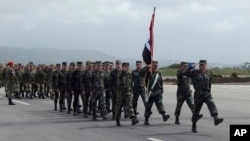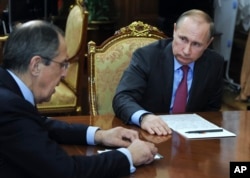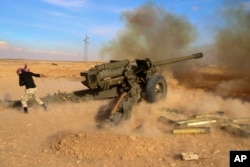Syria entered its sixth year of war Tuesday as diplomats met in Geneva to try to end the bloodshed that has killed more than 250,000 people and displaced more than half of the country's population.
U.N. Secretary-General Ban Ki-moon appealed to the parties, and those with influence on them, to make the negotiations a success.
“If we miss this opportunity, the consequences for the Syrian people and the world are too frightening to contemplate,” he said in a statement to mark the fifth anniversary of the war.
The international community has seen previous attempts at getting the parties to the negotiating table quickly fail. But this time, there seems to be the smallest glimmer of hope.
Russian withdrawal
One major factor was Monday’s announcement by Russian President Vladimir Putin that he had ordered the immediate withdrawal of the bulk of his forces from Syria after 5½ months of airstrikes. Russia said the strikes were aimed at Islamic State terrorists, but others disputed that, saying Moscow was attacking armed opposition groups.
George Washington University international relations professor Edmund Ghareeb said the Russian announcement sent the message that Moscow “would like to see a peace settlement in Syria and they are not planning on staying there forever.” He said the decision might boost the confidence of some in the moderate opposition as they meet with U.N. facilitators in Geneva.
U.S. Secretary of State John Kerry said Tuesday that he would head to Moscow next week to meet with Putin about the troop withdrawal and efforts to move the political process forward. "We have reached a very important phase in this process," Kerry said. "This is a moment to seize, not waste.”
Why now?
The Russian announcement came as a surprise to many international observers.
Russia’s U.N. envoy, Vitaly Churkin, said his government was now in a “political mode,” and that diplomats had “received marching orders to intensify our efforts to achieve a political settlement in Syria.”
“I think it is an encouraging sign, because it shows that everyone is behind moving toward a more political process now,” U.N. political chief Jeffrey Feltman told reporters Tuesday.
Some analysts believe Russia is now ready for serious peace talks because its air campaign has helped put President Bashar al-Assad and his government in a strong position heading into negotiations.
“They are satisfied with the military balance on the ground," Middle East Institute scholar Randa Slim told VOA. "Assad is in the best position militarily to negotiate an agreement in his favor.”
“We have to face reality,” one Security Council diplomat said recently. “The tide has turned dramatically to the regime, and they are seeking to translate that to supremacy at the negotiating table.”
No Plan B
Other factors — including the rising tide of refugees washing up on European shores, the destabilizing effect of 4 million refugees on Syria’s neighbors, the fear of the spread of terrorism and plunging global oil prices — are all weighing on nations with influence in wanting a negotiated end to the conflict.
“The only Plan B available is the return to war, and to an even worse war than we had so far,” Staffan de Mistura, U.N. special envoy for Syria, said Monday at the start of the latest round of intra-Syrian talks.
Two previous rounds of talks in Geneva collapsed quickly.
“If we see a quick collapse, that means things have not changed very much,” Ghareeb said of the current round of proximity talks — which de Mistura hopes will continue until March 24. “If they continue the talks and the participants don’t go home, that in itself would be a very significant development.”
De Mistura hopes to lessen the vast differences between the two sides during the discussions. He also hopes to lay out a road map for two future rounds of talks. They will be guided by principles in a U.N. Security Council resolution and a 2012 document known as the Geneva Communique. They set out the framework for a political transition, a new constitution and eventually elections.
“If we see serious progress made toward reaching this road map,” Slim of the Middle East Institute said, “this means Assad heard Moscow well and internalized the message Moscow sent.”






